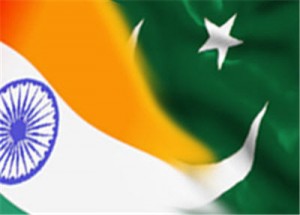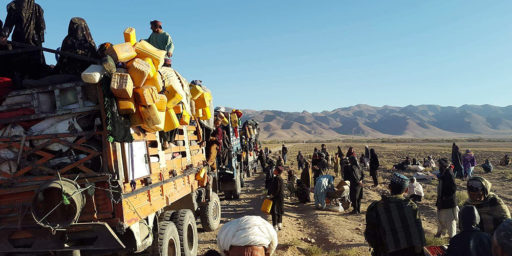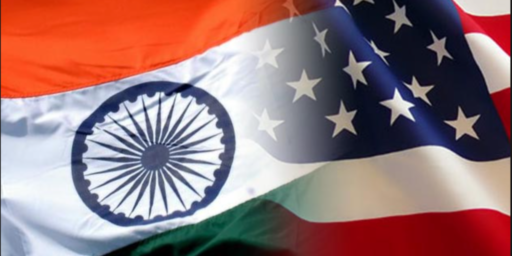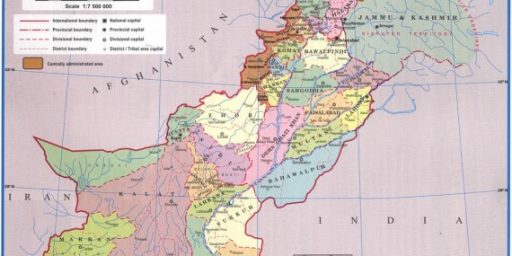Avoiding Pakistan and India War One Piece of Larger Puzzle
 Yesterday, Dave Schuler did an excellent job outlining the brewing mess on the subcontinent in Tensions Rising Between Pakistan and India. I’ve been blogging on the subject at New Atlanticist as well. My most recent posts on the subject are Pakistan Scales Down Anti-Terrorist Operations and Pakistan Readies for War with India.
Yesterday, Dave Schuler did an excellent job outlining the brewing mess on the subcontinent in Tensions Rising Between Pakistan and India. I’ve been blogging on the subject at New Atlanticist as well. My most recent posts on the subject are Pakistan Scales Down Anti-Terrorist Operations and Pakistan Readies for War with India.
The upshot is that Pakistan has failed to deal with its extremist elements for far too long, India’s government has irresponsibly ratcheted up the rhetoric in this particular conflict, and the international community — the United States especially — has let this go too far.
For the last seven years, Pakistan has been seen as an ally in the fight against the Taliban and al Qaeda and all other issues have been put on the back burner and all sins forgiven. Now, we’re going to have to be able to walk and chew gum at the same time — containing the Islamist militants, averting regional war, and staunching the flow of drugs and weapons. Not only are these tasks all essential, they’re interrelated.






This just sucks. If there had been just a few people in the Bush administration with influence and real knowledge about the Middle East maybe we could have avoided some of this. Iraq was never an existential threat. It was a thugocracy that was essentially contained. Afghanistan was necessary as a response to AQ, but Pakistan is part and parcel of dealing with Afghanistan. Handling Pakistan means dealing with India. That is where our efforts should have been focused. The lack of a comprehensive MIDDLE EAST policy has been obvious in our policy since this administration took over.
Steve
Afghanistan, India, and Pakistan aren’t considered “Middle East” (or Near East). They’re considered South Asia.
Steve, I think there was plenty of expertise but an urgent problem (Al Qaeda operations in Afghanistan and the Taliban government that supported them) that was politically necessary to deal with while a lot of the experts were recommending not doing anything.
BTW, I was opposed to a land intervention in Afghanistan largely for the reasons we see right now. However, I don’t think that lack of expertise was the central problem. Willingness to listen to the experts at hand, perhaps.
“India’s government has irresponsibly ratcheted up the rhetoric in this particular conflict”
Ok..so you can bomb the daylights out of Afghanistan(Taliban) based on a stupid grainy videotape. In our case, we caught a fidayeen alive along with evidence of his trail, his communication intercepts with known LeT commanders in Pak. We also had intercepted similar communication between terrorists who blew up our Kabul Embassy and all roads leads to Rome…err Terror state of Pakistan. And we are irresponsible..so that means the guys who planned and perpetrated the Mumbai attacks killing random 200 people of different nationalities..is the responsible one..give me a break..
>India’s government has irresponsibly ratcheted
>up the rhetoric in this particular conflict
If the Mumbai attack had occured in New York, do you think the US response would be anywhere near as restrained as India’s has been so far?
Sorry about the geography. Perhaps I should just say comprehensive foreign policy.
I was in agreement on operations in Afghanistan, but not in Iraq. It would have been difficult, and looked weak, to not deal with AQ in Afghanistan. My view is that the Bush foreign policy team was loaded with Cold war experts. Cheney is a mystery to me, as he should have had some knowledge about the area.
For a bunch of people who should have had some awareness of the long term issues of the area, they just didnt act that way. Afghanistan is a nightmare with its geography and tribal culture. If they were aware of the long term problems with the ISI, the FATA and India, why did they ignore these issues or just give carte blanche to Musharraf? To anwer my own question, I think they put all their energy into Iraq.
Steve